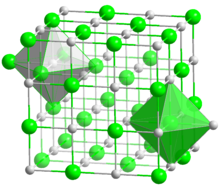Uranium carbide
This article needs additional citations for verification. (October 2010) |

| |
| Names | |
|---|---|
| IUPAC name
Uranium carbide
| |
| Identifiers | |
3D model (JSmol)
|
|
PubChem CID
|
|
CompTox Dashboard (EPA)
|
|
| |
| |
| Properties | |
| UC | |
| Molar mass | 250.04 g/mol |
| Density | 13.63 g/cm3 |
| Melting point | 2,350 °C (4,260 °F; 2,620 K)[1] |
| Structure | |
| cubic, cF8 | |
| Fm3m, No. 225 | |
Except where otherwise noted, data are given for materials in their standard state (at 25 °C [77 °F], 100 kPa).
| |
Uranium carbide, a carbide of uranium, is a hard refractory ceramic material. It comes in several stoichiometries (x differs in UCx), such as uranium methanide (UC, CAS number 12070-09-6), uranium sesquicarbide (U2C3, CAS number 12076-62-9),[2] and uranium acetylide (UC2, CAS number 12071-33-9).[3]
Like uranium dioxide and some other uranium compounds, uranium carbide can be used as a nuclear fuel for nuclear reactors, usually in the form of pellets or tablets. Uranium carbide fuel was used in late designs of nuclear thermal rockets.
Uranium carbide pellets are used as fuel kernels for the US version of pebble bed reactors; the German version uses uranium dioxide instead.
As nuclear fuel, uranium carbide can be used either on its own, or mixed with plutonium carbide (PuC and Pu2C3). The mixture is also labeled as uranium-plutonium carbide ( (U,Pu)C ).
Uranium carbide is also a popular target material for particle accelerators.[citation needed]
Ammonia synthesis from nitrogen and hydrogen is sometimes accomplished in the presence of uranium carbide acting as a catalyst.[4]
See also
References
- ^ Ma, Benjamin. Nuclear Reactor Materials and Applications. Van Nostrand Reinhold Co, 1983, p. 167.
- ^ Also called diuranium tricarbide, it was reported by Austin, A. E. (1959-02-01). "Carbon positions in uranium carbides". Acta Crystallographica. 12 (2). International Union of Crystallography (IUCr): 159–161. Bibcode:1959AcCry..12..159A. doi:10.1107/s0365110x59000445. ISSN 0365-110X.
- ^ Uranium dicarbide was reported by Bowman, A. L.; Arnold, G. P.; Witteman, W. G.; Wallace, T. C.; Nereson, N. G. (1966-11-01). "The crystal structure of UC2". Acta Crystallographica. 21 (5). International Union of Crystallography (IUCr): 670–671. Bibcode:1966AcCry..21..670B. doi:10.1107/s0365110x66003670. ISSN 0365-110X.
- ^ Hutchings, Graham J.; Heneghan, Catherine S.; Hudson, Ian D.; Taylor, Stuart H. (1996). "Uranium-oxide-based catalysts for the destruction of volatile chloro-organic compounds". Nature. 384 (6607). Springer Science and Business Media LLC: 341–343. Bibcode:1996Natur.384..341H. doi:10.1038/384341a0. ISSN 0028-0836. S2CID 4299921.
